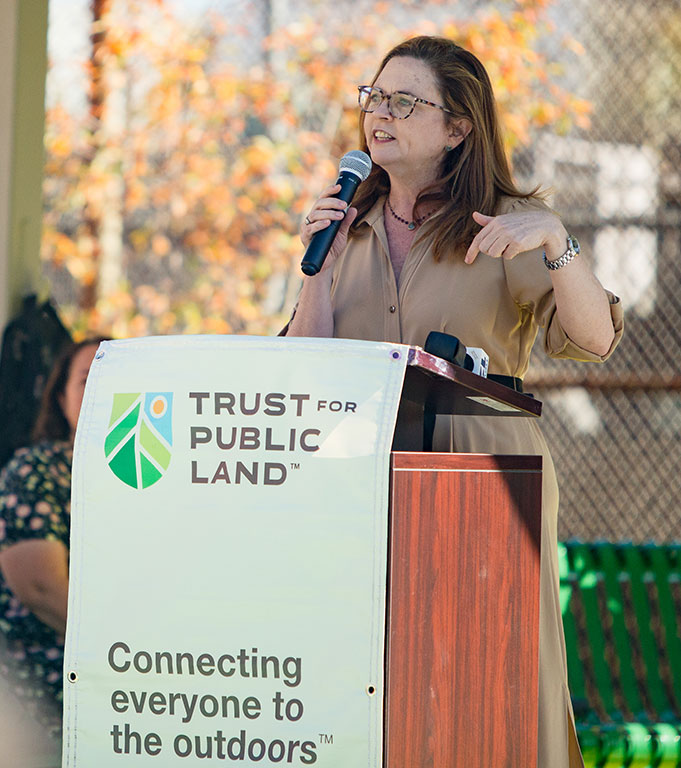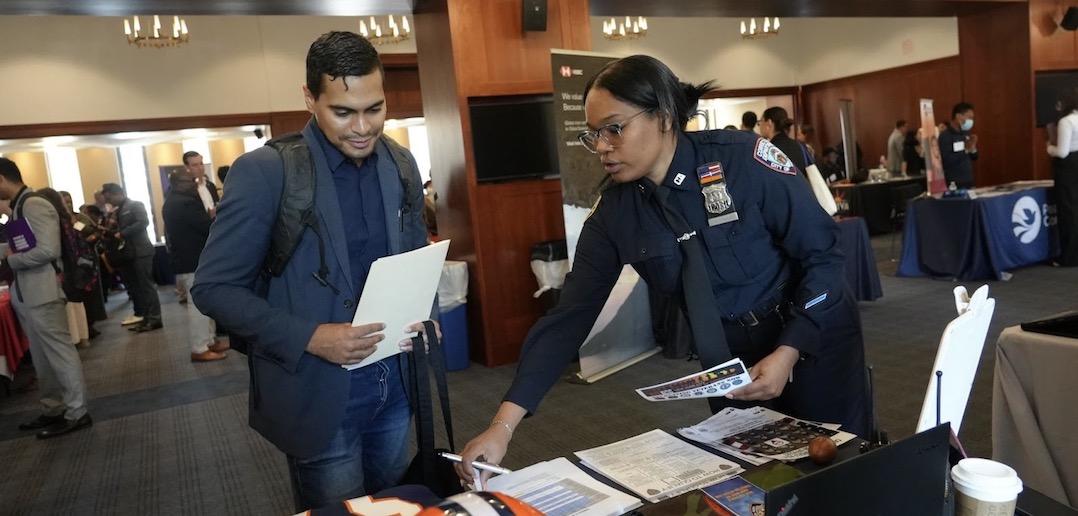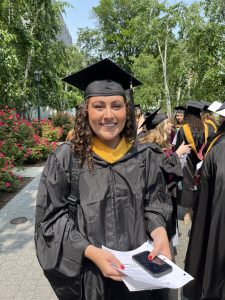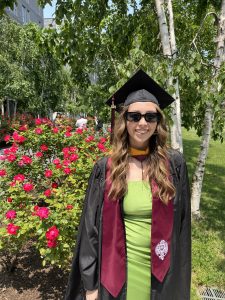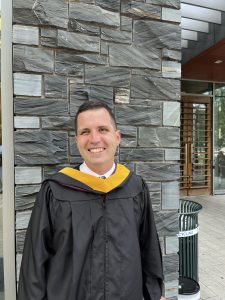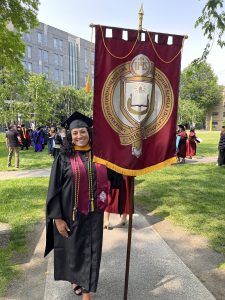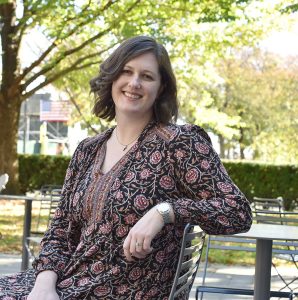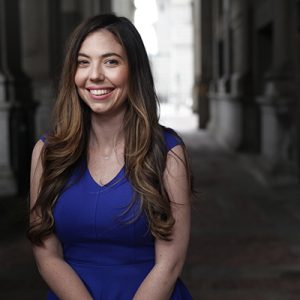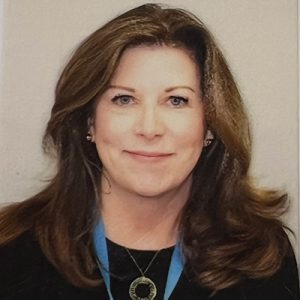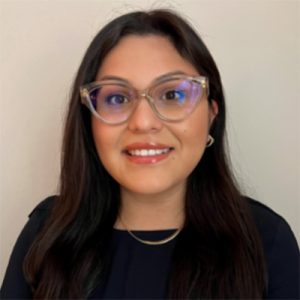Funding for the new outdoor play space was secured with help from Fordham’s Center for Educational Partnerships, a part of the University’s Graduate School of Education. The center partnered with MS 331 beginning in 2015, providing administrative help and assisting with tasks such as funding requests. GSE graduate Serapha Cruz is the principal of MS 331, which shares the complex with an elementary school, PS 306X.
Anita Batisti, Ph.D. associate dean and director of the Center for Educational Partnerships, said that one of Fordham’s mandates is to improve the wellness and well-being of students and the community. Studies have shown that clean, well-kept playground equipment helps students feel more connected to their community while promoting exercise and play.
“It really was a natural progression for us to do this,” Batisti said.
“With our skills for raising money and helping to prepare proposals and bids, we were able to move this process along through the various funding sources.”
Fordham President Tania Tetlow joined Batisti at the Oct. 25 ribbon-cutting ceremony for the 46,0000-square-foot play area. Also in attendance were GSE Acting Dean Ji Seon Lee, U.S. Representative Ritchie Torres; Bronx Borough President Vanessa Gibson; Councilmember Pierina Ana Sanchez, who helped secure funding for the project; and representatives from the Trust for Public Land and the Department of Environmental Protection, which oversaw the design and construction of the space.
When work on the $2.85 million project began in 2021, the space in the Morris Heights section of the Bronx was a cracked, crumbling stretch of asphalt. It now features a full basketball court, a volleyball court, game tables, an outdoor classroom, a gazebo, and play equipment for younger children. There is also fitness equipment for older students and community members, benches, a running track, and a turf field for soccer and football.
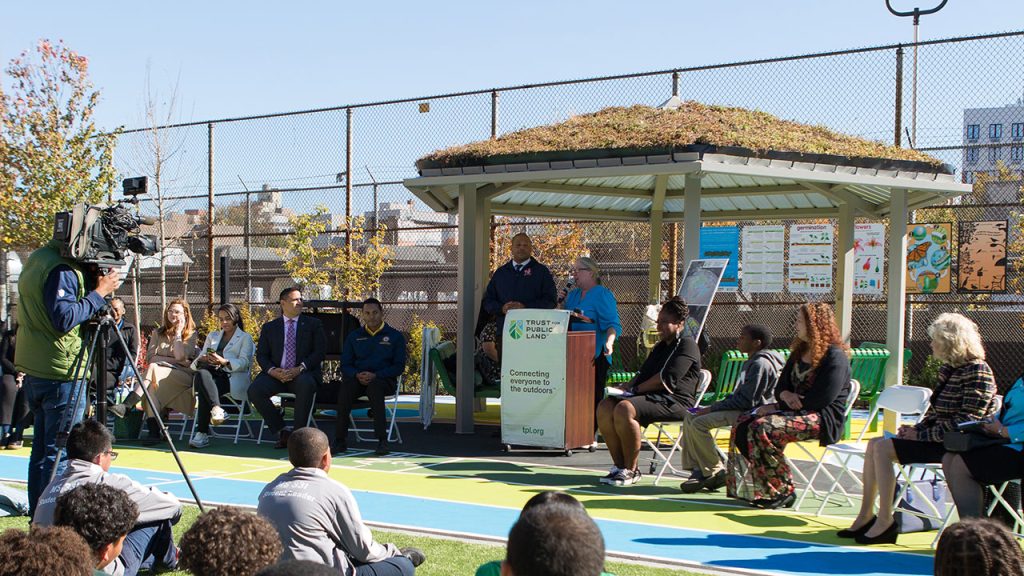
Through a partnership with Fordham’s London campus, GSS students can study abroad, learning about the differences between social work in the U.S. and the U.K. and visiting historic sites. This past summer, about 30 students participated in the two-week program, but two of them stayed behind for three more months to complete inaugural field internships abroad.
“I felt like this program was made for me,” said Melanie Hills, 24, a master’s student from Glastonbury, Connecticut, who interned at a London community center and served predominantly immigrant populations. “It’s a multi-service, multigenerational approach—and it’s exactly what social work, in my mind, stands for.”
A Moving Encounter with an Asylum Seeker
Hills worked at Coin Street, a community center that serves Waterloo and North Southwark residents, where she assessed the needs of local families and connected them with services. She recalled a pregnant woman who had experienced human trafficking in her native country and was seeking asylum in London with her two young daughters. Hills said she was able to connect the mother with a local school for her children, a children’s center that could teach her daughters how to communicate in English, and a midwife who could alleviate her stomach pain, despite some initial language barriers.
“We couldn’t understand each other because our translator phone wasn’t working, so we just stood there, trying to communicate with each other. Finally, I used Google Translate,” Hills said. “She gave me this big hug afterwards, and I was like, ‘OK, this is why [we]do this.”
As someone who isn’t native to the area, said Hills, it wasn’t easy to connect Londoners with certain services and understand what rights and entitlements they qualified for. But by the end of her internship, she described herself as “self-sufficient.”
“I had support from Fordham the whole way through and from Coin Street, but I really worked hard, and I’m proud of myself,” said Hills, who regularly checked in with GSS faculty, deans, and her supervisor while abroad.
This spring, Hills will graduate with her master’s degree in social work, and plans to work in hospital administration.
“Being in London taught me how competent and powerful I can be,” she said.
‘Helping People to Be Their Best Selves’
Master’s student Vaughn Rush interned at Oxford House, one of the first settlement houses in the United Kingdom that has evolved into a modern-day community center. Rush said he helped to facilitate multiple events, including a Somali culture festival and a “Black history bike ride.”
“It felt [like]social work in a community-based sense because … they embedded the community in getting things that the community needed and working with them to help themselves,” he said.
Rush, a 36 year old from Jamaica, Queens, has worn many hats. He is a veteran who served as a behavioral health specialist and medic in the U.S. Army for seven years and a male drag queen, among other things. After graduating this spring with his master’s degree in social work, he plans to earn his master’s degree in applied theater. He wants to combine his social work and theater skills “to make some mental health magic” in a non-traditional way, ideally for the U.S. Army or the Department of Veterans Affairs, he said.
What he will take from his London internship experience is his growth in empathy, he said.
“Listening to the differences in people’s lives and their values … showed the differences between us, but also the things we have in common,” Rush said, “and that helps with us being one big world … and helping people to be their best selves.”
Watch the video below and learn more about the GSS program abroad.
]]>
A history teacher helps middle schoolers chart their own course
In her first year at Fordham, Chantal Chevalier took a job in the admission office that showed her the kind of career she didn’t want to pursue.
“I realized that I did not like working in an office,” the Bronx native admits. “I talk too much, and I can’t look at a wall all day.”
When an opportunity arose for her to become a volunteer teacher with Generation Citizen, a group that partners with schools to provide civics lessons, she gave it a shot—and there was no turning back.
“I learned that I have a different connection with kids,” Chevalier says.
In her sophomore year, she began working as a college transition coach for the Student Leadership Network, helping juniors and seniors at In-Tech Academy in the Bronx apply to colleges, find financial aid opportunities, and plan for a big transition, potentially away from home.
Jump-Starting a Career in Education
Meanwhile, she switched her major from psychology to history and began looking into the Graduate School of Education’s accelerated Master of Science in Teaching program. That program, one of more than 30 dual-degree programs at Fordham, allowed her to take graduate-level courses as a senior and earn a master’s degree with only one additional year of study.
Now, after earning a bachelor’s degree in history at Fordham College at Rose Hill in 2020 and her master’s in teaching the following year, she’s a seventh grade history teacher at the City College Academy of the Arts in upper Manhattan. She encourages her middle schoolers to start thinking about college as an option.
“That’s something that I’m really passionate about,” she says. “It’s very overwhelming for a lot of kids, especially if your parents didn’t go to college, or they went 40 years ago. It’s a completely different process now.”
Chevalier is just as passionate about teaching history, and she says that highlighting the human elements of past events is a key to keeping students engaged.
“I try to bring them together through the stories of people,” she explains. “I think that’s where you can learn a lot about human interaction and society, and what makes a society successful and what makes a society fail.”
She is also cognizant, she says, of how histories are told from specific perspectives.
“I think my approach is always to be as honest but as careful as possible, because I never want to put my own opinion into a student’s mind,” Chevalier says. “My job as an educator is to go in and to teach certain skills, to teach certain content, while also acknowledging who I am in this world.”
As a first-generation college graduate who was raised by a single mom, Chevalier is well aware of the challenges many middle school students and families face making ends meet.
“I want to be able to put my kids on to new opportunities, to tell them about the different things that they can do with their lives,” she says. “Where you are and where you were born is not the end-all be-all. You can create your own path, your own opportunity.”
Read more “20 in Their 20s” profiles.
]]>Students and faculty in Fordham’s Graduate School of Social Service are supporting women asylum seekers, one of the most vulnerable populations in New York City, by working with them to increase access to health care and mental health services and advocate for the protection of migrants’ rights.
On Nov. 10, they convened with activists who work in academia, city government, the law—and women asylum seekers themselves—to talk about future work and solutions.
‘The Solutions Will Come From People’s Voices’
Over the past year and a half, more than 130,600 migrants arrived in New York City from countries like Venezuela and Senegal, seeking asylum from violence, persecution, and other traumas in their homelands. The city provides temporary shelter and helps migrants to apply for legal status, work authorization, and permanent housing, but it’s not easy to address every single need. In fact, the city just announced that it is limiting shelter stays for migrant families with children to 60 days in its housing system.
“The city is doing the best that they can. But the solutions to what’s happening right now are not going to be coming from the city,” said Anne Williams-Isom, FCLC ’86, New York City deputy mayor for health and human services, at the symposium, which was held at Fordham’s Lincoln Center campus. “The solutions will come from people’s voices who have experienced this and who are sharing their stories with us, and hoping that academia and government and others will listen.”
Her Migrant Hub
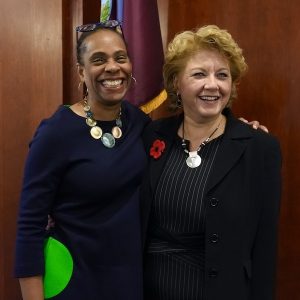
Those in academia are listening. Through Her Migrant Hub, a website created by Fordham faculty, students, and women asylum seekers, migrants in New York City are able to better understand their rights in the U.S. and easily access services with a direct impact on women’s well-being, such as health care, housing, and mental health. Perhaps most uniquely, they are taught how to tell their own stories and to advocate for themselves and their loved ones.
Her Migrant Hub has greatly expanded since its inception in 2021. The community-driven program, which primarily receives funding from the Mother Cabrini Health Foundation and is supported by additional funding from organizations like World Education Services Mariam Assefa Fund, is revamping its web platform based on suggestions from women migrants, students, scholars, and service providers. The website was updated this November with several new additions, including direct mental health support via phone, text, or video on the platform itself.
In addition, Her Migrant Hub now has an advisory board that includes eight women asylum seekers who have become activists. Six of them are from the initial core Her Migrant Hub group; one is a representative for newly arrived women asylum seekers, and another is a representative of the community of indigenous Garifuna women asylum seekers. The board also includes two service providers who are able to listen to the women and develop solutions based on their feedback. They now meet in a dedicated space at the Lincoln Center campus that the activists and GSS students will decorate to reflect the different cultures and shared stories of the community.
The Her Migrant Hub team, led by GSS professors Marciana Popescu, Ph.D., and Dana Alonzo, Ph.D., is also planning a series of trainings on trauma-informed care, migration-related trauma, and vicarious trauma for service providers who work with this population in New York City. Women asylum seekers will also receive training on how to educate migrant communities, employers, and service providers about forced migration and the challenges faced by their community.
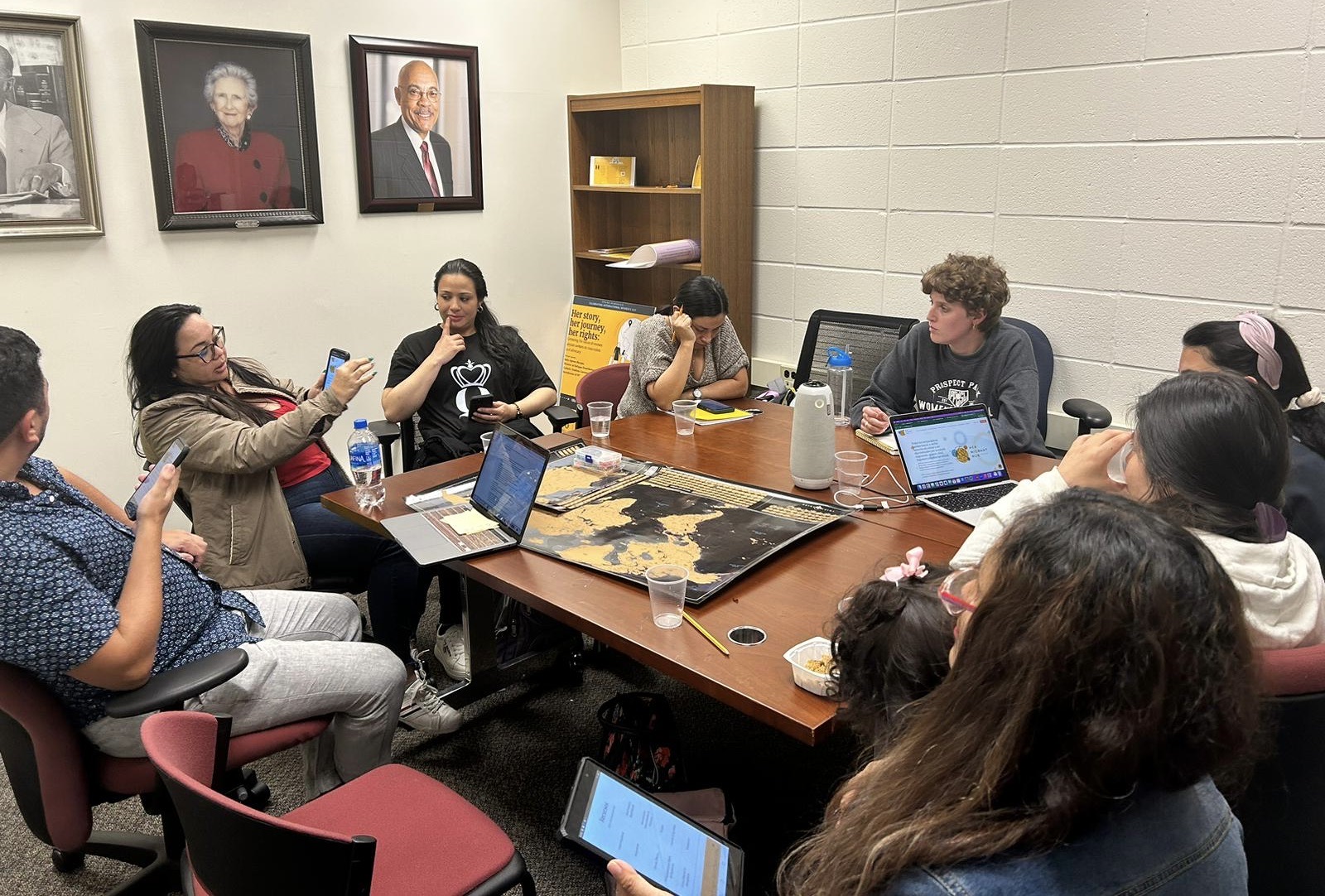
Students Engaging with Migrants in Crisis
GSS students are engaged in all of these efforts. Two sit on the advisory board alongside the asylum seekers. Eight are interning at organizations such as the New York City Mayor’s Office’s new Asylum Application Support Center and Emma’s Torch. Others are participating in Forced Migration and Social Work Policy and Practice, a new course co-developed by GSS professors and Her Migrant Hub’s women activists. This course is part of a project funded by New York Community Trust, which aims to develop best practices for social workers who work with migrant populations and engage students in specialized internships.
Most recently, in October, clinical social work students under the supervision of Alonzo began providing one-on-one mental health support to migrants through the Her Migrant Hub website.
Among the students involved in this collective work is Luisa Fernanda Sandoval Cortes, a Ph.D. student who serves as a case manager coordinator for a program for asylum seekers at Catholic Charities of New York. For Her Migrant Hub, she is a project coordinator, facilitating a mental health group for new women asylum seekers. She shared some key takeaways from her experiences at the Nov. 10 symposium.
“Social workers and professionals should be trained in assisting asylum seekers from an intersectionality perspective to be able to understand gender, race, language, and cultural differences among this population,” said Cortes, who also emphasized the importance of providing fast and extended work permits to migrants. “And I would add empathy.”
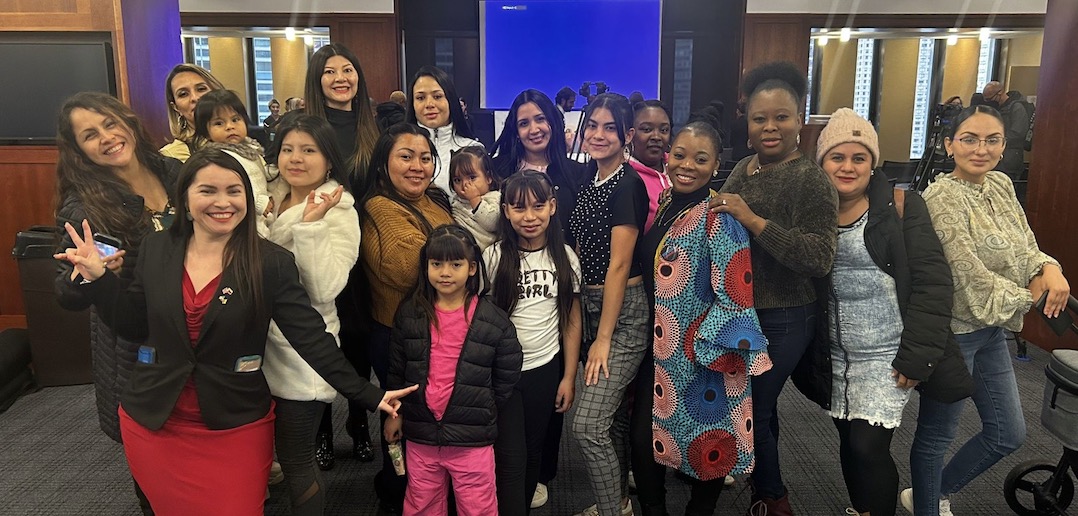
Read more about the symposium.
]]>“Making the transition from the military is not an easy feat. We know this,” said Matthew Butler, a former master sergeant in the U.S. Marine Corps who now serves as senior director of Fordham’s Office of Military and Veterans’ Services, in his address to students and alumni at one of the events. “And we want to give you all the support and preparation needed to make sure you land the job that you want.”
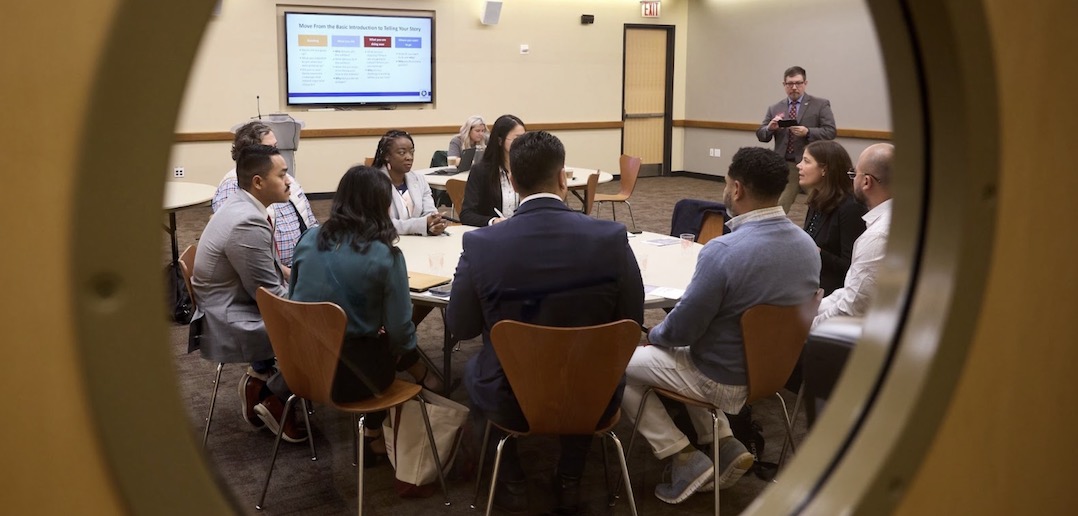
Networking with the FBI, Morgan Stanley, and NBC Universal
About 140 student veterans and alumni from 11 schools attended Veterans Career Day and Student Veteran Internship and Career Fair at the Lincoln Center campus. At Veterans Career Day on Oct. 4, students and alumni took free LinkedIn headshots, polished their resumes, and practiced their elevator pitch with industry professionals, some of whom were student veterans themselves. The next day, they attended the internship and career fair, held specifically for student veterans, where they had the opportunity to network with representatives from more than 30 organizations, including L’Oreal, the Federal Reserve Board, Morgan Stanley, the FBI, and NBC Universal.
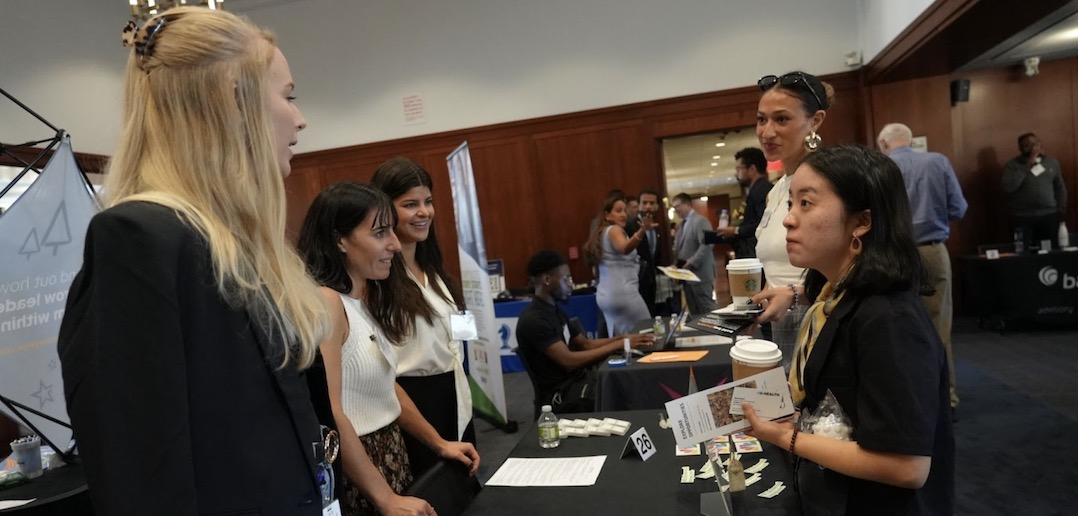
Both undergraduate and graduate students from varied disciplines, including art history, economics, and finance, came to the career fair.
Among them was Steven Gutierrez, 32, an MBA student at the Gabelli School of Business. Gutierrez was born and raised in the Bronx and went on to serve in the U.S. Marine Corps for about a decade. He was dispatched all over the world—to Afghanistan, Central America, France, Italy, Japan, Kuwait, Kyrgyzstan, Switzerland, and other locations—where he served as a radio technician and officer. He now works in Fordham’s Career Center as the veterans career liaison, where he helps his peers navigate the next chapter of their lives—charting their career path.
“Typically, student veterans have worldwide experience. They bring with them discipline and accountability. The experience that they had in any of the services, it’s translatable and needed,” said Gutierrez, who plans on becoming a consultant.
From Serving as an Airborne Combat Medic to Studying at Fordham
Glenmore Marshall, a student at Fordham’s School of Professional and Continuing Studies, attended both Veterans Career Day and the Student Veteran Internship and Career Fair.
“I came to this event to find a way to better myself,” said Marshall, 37, who was born in Jamaica and grew up in the U.S. “I want to put my best foot forward and see what’s out there.”
After attending several workshops at Veterans Career Day, he said he realized that he was “underselling” his two years of experience as a U.S. Army airborne combat medic.
“I have a lot of skills I’m not showing to employers: specific skills like leadership, attention to detail, and being able to work under extremely stressful situations. As a combat medic, for example … I have to do blood transfusions. … I had to do one on a lieutenant in a Humvee in the middle of nowhere before,” said Marshall, who served in several states across the U.S., including North Carolina, Oklahoma, and Texas. “This [career readiness]workshop helped me realize … that I should utilize my background as a veteran to my advantage and not undersell myself.”
At the fair, Marshall—an information and technology major who is looking for a job or an internship—spoke with representatives from several organizations, including the Peace Corps and IPG Health. “More people should come out to this type of thing because even if you don’t necessarily get hired or get the job, the experiences you get from today, you can apply elsewhere and realize the soft skills that you didn’t know you had,” said Marshall, who aims to become a technician or consultant.
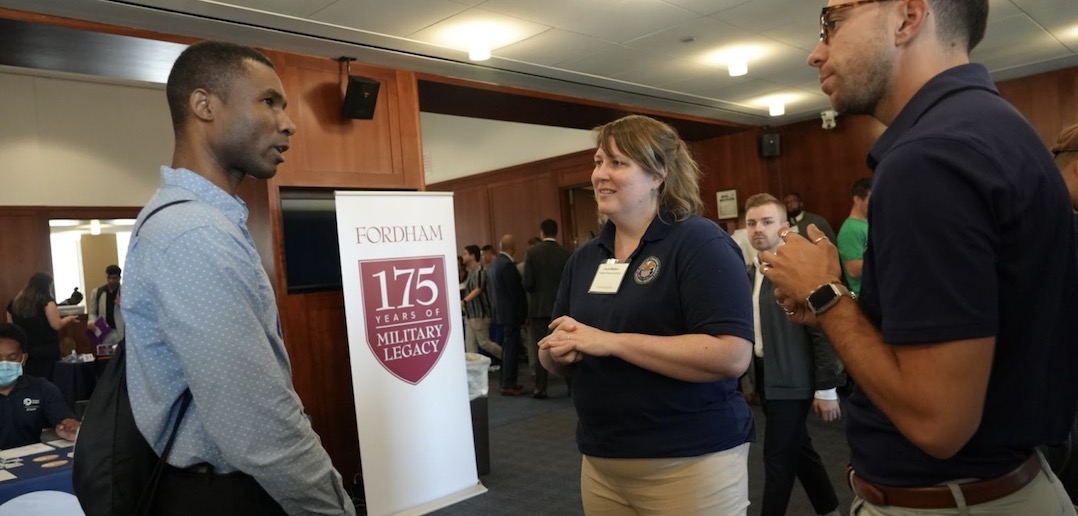
Providing Opportunities for the Larger Community
Miguel-Angel Sandoval, 30, a senior real estate major at PCS and vice president of Student Veterans of America at Fordham, said the Student Veteran Internship and Career Fair was his first-ever career fair.
“A lot of the representatives of these corporations were welcoming and willing to have a conversation with you, understand who you are … and how they can get you to fit in there,” Sandoval said. “They want to see you excel. They want to see you employed, so they’re willing to do the extra work in getting to know you as well as you getting to know them.”
Sandoval added that he is “forever grateful for Fordham.”
“Fordham does everything it can to provide every opportunity to all its students, no matter who they are—student veterans or regular traditional students,” said Sandoval, who served in the U.S. Army for more than five years in South Korea and West Point, and is still serving as an Army ROTC cadet. “Over 30 employers came out specifically to speak to us, and I think it’s a blessing.”
The events were co-sponsored by Fordham’s Office of Military and Veterans’ Services, Fordham’s Career Center, Student Veterans of America at Fordham, and multiple outside partners and institutions, including Columbia University, John Jay College of Criminal Justice, Pace University, Lord, Abbett & Co. LLC, RSM US LLP, Baker Tilly, and Jetro Restaurant Depot.
“We open our doors to our fellow veterans because we know having hope and purpose in the future is an antidote to the inevitable dark days ahead or when the road gets rough,” said Butler. “A job can be the thing [where]one finds both purpose and a better future, while continuing to serve others and paying it forward.”
]]>“They’re writing for the academic audience, but what about us high school students?” asked Suvanni Oates, a high schooler from Bronxdale High School who is an intern for the project. “What about us students who can’t receive that message that they’re trying to send in that way?”
From June 14 through 16, Fordham welcomed 12 scholar-authors from multiple universities alongside local New York City high school students and Fordham undergraduates for a writing workshop where they could all learn from each other.
Creating New Articles—and TikTok Videos
“High school students were introduced to undergraduates [and they are]working with linguistic anthropologists, our authors. We prepared student teams to each read one author’s paper and give feedback on what they understood, what they didn’t understand, what spoke to them,” said Ayala Fader, Ph.D., professor of anthropology at Fordham and founding director of both the Demystifying Language Project and Fordham’s New York Center for Public Anthropology, which is launching next year.
During the workshop, held at the Lincoln Center campus, teams of undergrads and high school students worked with their author to “transpose” previously published articles into two-page digital pieces in language teens can understand. Students even spent a day making TikToks that conveyed the main messages of the articles.
“To hear [the authors’]perspective and actually work with them in person, that was the cool part,” said one of the Bronxdale high schoolers, Athalia McCormack.
The resulting 12 papers will be published as a multimedia open educational resource on the website for Fordham’s New York Center for Public Anthropology.
“Our long-term goals include housing these 12 digital pieces on an interactive website that will be free to use,” said Fader. “We hope that this is going to be a resource for high school teachers to use in existing curricula and also for high school students to experiment with social science, especially linguistic anthropology, which is not part of most curricula in NYC public schools.”
Fordham Students See the Impact
Sitara Vaidy, who graduated from Fordham College at Lincoln Center in May with a psychology and sociology major, was one of the Fordham students working on the project. She said the workshop “allowed the high school students to better understand the significance of fields such as anthropology, sociology, linguistics, etc., and the interesting and important work that they produce.”
Theater and anthropology major Ashira Fischer-Wachspress, FCLC ’23, who also worked with the teams, said she appreciated the justice aspect of the work.
“I am very grateful for the opportunity to have met so many fascinating, driven people working for social justice,” she said.
Expanding into Communities
The DLP is also planning to use the short articles in a summer institute for high school students, where they will study language and power in their own communities. The following summer they plan to host a teacher-training institute.
“By demystifying students’ own experiences with language, the DLP strives to create a grounded, hands-on, potentially life-changing set of social justice tools for high school students and teachers and the faculty and undergraduates who collaborate with them,” Fader said.
The DLP has been externally supported by a Spencer Conference Grant and a Wenner-Gren Workshop Grant. Internal support comes from an Arts and Sciences Dean’s Challenge Grant and Fordham’s Center for Community Engaged Learning, who hosted the pilot project in 2019, and will be collaborating on future programs. Fordham members of the organizing committee include Johanna Quinn, Ph.D. (sociology); Britta Ingebretson, Ph.D. (MLL); and Crystal Colombini, Ph.D. (the Writing Center), who were joined by Mike Mena, Ph.D. (Brooklyn College); Justin Coles, Ph.D. (UMass); Lynnette Arnold, Ph.D. (UMass); Bambi Schieffelin, Ph.D. (NYU), and high school teacher Scott Storm (Harvest Collegiate).
]]>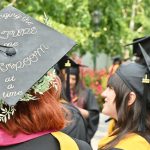
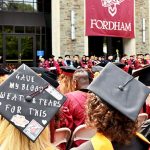
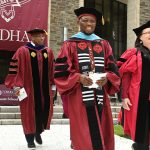
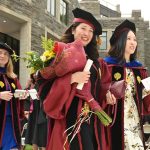
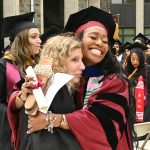
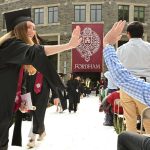
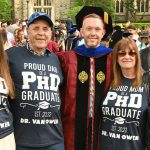
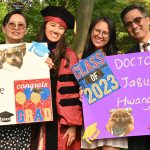
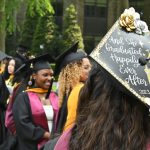
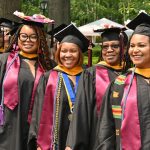
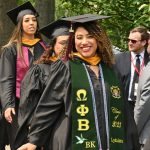
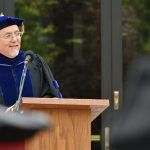
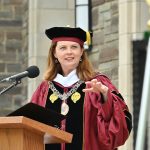
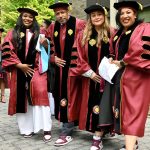
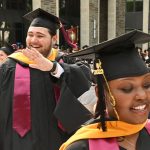
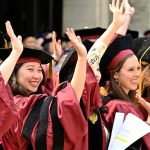 “To teach is to become the ultimate force multiplier. Teaching means creating opportunity. Every day of your chosen career, you will achieve more than most people can ever dream to.”
“To teach is to become the ultimate force multiplier. Teaching means creating opportunity. Every day of your chosen career, you will achieve more than most people can ever dream to.”
These were some of the words of encouragement and inspiration that Fordham President Tania Tetlow shared with the Graduate School of Education (GSE) Class of 2023 on Monday, May 22.
At the diploma ceremony, held in front of the Walsh Family Library on the University’s Rose Hill campus, Fordham bestowed master’s and doctoral degrees upon students across GSE’s programs, from newly minted classroom teachers and school psychologists to educational leaders and administrators looking to advance in their careers.
Accelerated Teaching Program Leads to ‘Amazing’ Job
For Margaret Costikyan, the day capped a five-year journey that began in 2018, when she enrolled at Fordham College at Rose Hill as an undergraduate. She knew she wanted to become a classroom teacher—and she knew Fordham’s accelerated five-year Master of Science in Teaching program would get her there faster.
Now, having earned an M.S.T. one year after receiving a B.S. in psychology and sociology, she’ll be teaching full time at the Bronx public school where she did her student teaching.
“The school where I was placed, PS 71—the community there is amazing,” Costikyan said. “I’ve met so many teachers who want to support me as a first-year teacher, so I’m really excited and thankful to Fordham for that.”
A Focus on the Socioemotional Needs of Children
Fordham GSE’s partnership with the New York City Department of Education was a draw for Samantha McCusker, who received a master’s degree in school psychology.
“Being able to use that as a connection to network was a big point,” McCusker said, adding that when she initially met with professors at GSE, “it just felt like home to me.” Since 2021, her second year in the program, she’s been working as a school psychologist in Harlem, and she takes pride in being able to serve her students.
“Learning from the kids that I’m around and how they live, and seeing how I can best support them, is probably the most impactful part of my job,” she said.
The socioemotional needs of students have been front of mind for most educators, especially as schools have tried to catch up from the disruptions caused by the COVID-19 pandemic, remote learning, and all the associated stressors.
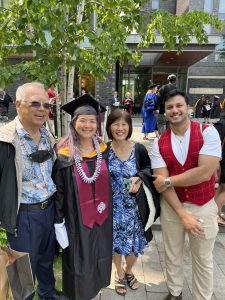
Shannon Urabe, who completed the online M.S.T. program, began teaching sixth and seventh graders at the Windward School on Manhattan’s Upper East Side during her time in the program. She has felt increasingly optimistic as she’s watched her students readjust to in-person learning.
“Seeing how the kids have swung back around from COVID and seeing how they’re re-learning how to engage with one another has been good to see. They’re embracing connecting with one another,” said Urabe, whose parents came from Hawaii to watch her graduate.
Finding Community—and Benefiting from Program Flexibility
Urabe said the flexibility of the online program was a big factor in her grad school experience. “It was an easy transition [beginning the program in August 2020, during COVID],” she said, “because they were already prepared for this type of learning,”
The flexible nature of GSE’s programs was also a draw for Joseph Dujmovic, a Queens native who earned a Master of Science degree in the Educational Leadership, Administration, and Policy division. Over his two years in the program, which included courses in person and online, he was able to keep up with classes while spending summers in Croatia and working as division head of the upper school at the Academy of St. Joseph in Greenwich Village.
Dujmovic said he appreciated receiving one of the faith-based scholarships Fordham offers to employees of Catholic schools, and he built close relationships with faculty. A particular highlight, he said, was a class with adjunct professor Anthony Miserandino, Ph.D., GSE ’77, ’84, on implementing change at an institutional level. “It was incredible, and he’s been a great mentor ever since.”
For Maria Cimina, who began the master’s program in mental health counseling fully online in 2021 but transitioned to in-person classes over her two years, building close relationships with her cohort was central to her experience. She became one of the leaders of the Student Association for Mental Health Counseling, a network for both students and alumni of the program, with Professor Eric Chen, Ph.D., calling her “a star of our mental health counseling student leadership team.”
“Finding a space in the community was really important for me,” Cimina said. “We had such a strong cohort, and it was really important to reinvest in the people and the work that we were doing, and really drive home how important it was to be present on campus.
“There’s a beautiful sense of community. If you’re willing to take advantage of that, the program itself will expand in value tenfold.”
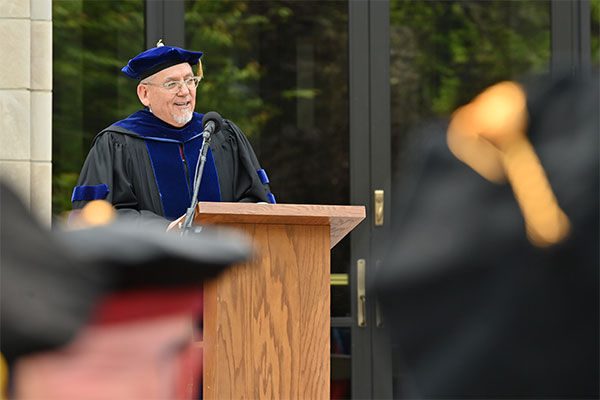
But for Annie George-Puskar, Ph.D., an assistant professor of curriculum and teaching at the Graduate School of Education (GSE), there was a silver lining to the way education was conducted during the pandemic. It brought into sharp relief the ways that teachers can work with caregivers to help students transition into new learning environments.
Listening to Early-Childhood Educators
Those teacher-caregiver relationships are the focus George-Puskar’s study, “Early Childhood Educators’ Perspectives on Child & Family Transitions into Preschool in NYC,” which was published on May 17 by the NYC Early Childhood Research Network.
It was almost a very different study. With a grant from the GSE dean’s office and the Early Childhood Research Network, George-Puskar had been set to study the ways special education students made the transition into preschool. But the onset of the COVID-19 pandemic in March 2020 and the shift to online learning forced her to change her research.
“The pandemic really shifted my focus to teacher-parent relationships rather than teacher-child relationships,” said George-Puskar.
“We talk so much about child readiness in terms of academic and social skills, and self-help skills, but how are you really gauging if parents are ready to send their kids to school? And how can you work with parents to communicate more effectively as you support them and caregivers in this transition?”
George-Puskar had already specialized in the transitions that students make as they enter pre-school when she joined GSE in 2019. It was a particularly timely area of study, as New York City had launched its “3-K for all” pre-k program five years earlier.
For this study, she worked with the New York City Department of Education’s division of early childhood education and early childhood professionals from private schools to embark on a survey that was not just limited to special education. The questions focused on what technologies teachers used during the pandemic to communicate with parents, and how they affected the transition into preschool.
Examples of the questions in the survey included: “Thinking about the transition into your classroom, how do you know a transition is successful for a child and family?” as well as “What are the biggest challenges to successful transitions into your classroom/program?” and “Thinking about the experience from last year to what you did this year around the transition, what is the biggest difference?”
In all, she and her study co-author Jill Gandhi, Ph.D., received 327 responses from schools from all five boroughs. Researchers also spoke with 20 respondents in follow-up interviews.
Effective Communication with Caregivers
“One of the things that we asked quite a bit about is the amount and type of communication that happened prior to a child starting on the first day,” George-Puskar said.
The biggest barrier to reaching families is ineffective communication, she said, so one of the best practices recommended is using communication technology they learned to use during the pandemic.
“The teachers who had had professional development [about 45%]were really creative in how they used technology in the classroom to really make the child and the family feel welcome and prepared for the start of the school year.”
Whereas these teachers did things like send newsletters and emails and invited children and families to in-person or virtual classroom tours, those who hadn’t received training tended to only reach out to parents when there was a problem.
“Only making calls when something’s wrong is not a great way to collaborate with parents, or make them feel good about what’s going on in the classroom,” she said.
“So, using those communicative and collaborative practices to establish a rapport with families is what we need to focus on for those teachers.”
George-Puskar became interested in working with children with disabilities when she was an undergraduate and even wrote her master’s thesis on how kids on the autism spectrum learn through different levels of play. Working with the family of a boy who was diagnosed with autism at three years old, she saw the stressors that are placed on parents as they navigate education and service systems.
“I also realized that I study transitions because I don’t like them,” she said laughing.
“I have a hard time with transitions, so it’s a helpful outlet for me to say, ‘How can we make this easier on parents and caregivers, including myself?”
Developing Leaders at All Levels
In addition to transitions and play-based learning, George-Puskar studies leadership development in early childhood special education. Last September, she co-hosted a panel workshop at the Division for Early Childhood & International Society of Early Intervention joint conference in Chicago.
Her goal is to take lessons about leadership from the business world and organizational psychology and apply them to education.
“When we talk about educational leaders, it kind of equates to administrative leaders and school building leaders,” she said.
“But I really want to emphasize how you can develop leaders at all levels, as teachers and assistant teachers in the classroom, and as students preparing to become teachers. You don’t have to have a title to be a good leader.”
]]>“I think my own experiences with counseling were really transformative,” Syper said, adding that she enjoys being able to “be part of people’s lives and help them through really difficult experiences.”
Now, studying at Fordham, Syper found that the support from peers and professors combined with the well-rounded curriculum and hands-on practicums have set her up to do just that.
“When I interviewed at Fordham, I felt connected to the people. I felt like I could build a community with professors and with the other students,” Syper said.
Using Dance Therapy in Body Image Work
Syper plans to combine her counseling work with another form of therapy that’s been meaningful in her own life—dance. Discovering dance as a teenager taught Syper to connect with and appreciate her body. And in college at the University of North Texas, she studied modern dance and double-majored in psychology and dance.
In addition to her studies at Fordham, Syper’s working to become a dance/movement therapist through a program at the 92nd Street Y, where she’s learning how to help people connect with their bodies in meaningful ways that assist their healing processes. Syper works with teens and young adults with body image issues and eating disorders and finds it’s often beneficial to incorporate elements of dance therapy into her talk therapy sessions.
With clients, Syper helps them assess: “How do I know if I’m anxious? How do I know if I’m upset? What are the cues my body’s giving me? And how can I connect with my body? … How do I use that information to identify what’s going to make me feel better moving forward?”
‘A Gifted Therapist’
Currently, Syper’s wrapping up a year-long internship at University of Colorado Boulder’s Counseling and Psychiatric Services (CAPS) as part of her Fordham Ph.D. program. Similar to a med student’s residency, the position gives her hands-on clinical experience wherein Syper conducts individual therapy sessions, co-leads graduate student process groups, and serves as an eating concerns case manager.
“She’s a very talented, gifted therapist who, at an early stage of her career already has very defined interests and expertise,” said Elizabeth Parsons, Syper’s clinical supervisor in Boulder. In particular, Syper is highly organized and adept at building a strong rapport with clients quickly, Parsons said.
“[Syper is] very effective in helping clients understand their own patterns in a way that they can shift them … she really meets people where they’re at,” Parsons said. “She’s very aware as well of social justice issues and able to connect with people across a lot of identity variables.”
A Holistic Approach, Mirrored at Fordham
At Fordham, Syper found the same support and holistic approach to her as a student that she fosters in her professional work.
“Fordham really provided the opportunity for us to acknowledge what comes up for us as therapists when we’re holding the weight of all the things our clients are sharing, and we’re going through these really difficult experiences alongside them—like when a global pandemic happens, we’re also experiencing that,” Syper said. “[Or if] they’re experiencing body image concerns, and I have had body image concerns, how do I work through that so I can take care of myself and I can be the best support for my clients.”
Recently, Syper successfully defended her dissertation, “Mind-Body Connection, Self-Esteem, and Social Support as Predictors of Recovery from Anorexia Nervosa,” and also published a study about the mind-body connection in the American Journal of Dance Therapy, titled “Dance/Movement Therapy for Individuals with Eating Disorders: A Phenomenological Approach.”
After graduation, Syper will complete her 92nd Street Y program and plans to work in a clinic or treatment center that serves young adults with eating disorders and body image concerns as she continues to find ways to incorporate dance therapy into her work.
—Meredith Lawrence
]]>Education is a rare privilege in his hometown, and many students quit because it’s too challenging to get to school, but Zongo persisted because he believes knowledge is a potent tool, he said.
From Burkina Faso to Manhattan: A Long Journey for Higher Education
“School for me is like a vessel of knowledge,” Zongo said. “School is something that I always look up to, to have a place where people can better themselves and learn and grow and even possibly learn about the world and different things in life.”
Zongo was accepted to the University of Ouagadougou, in Burkina Faso’s capital, but couldn’t start the program because of a lack of funding and study materials. In 2013, he came to the U.S. on a Diversity Immigrant Visa—a lottery-selected program available to people from countries with low U.S. immigration rates. Looking back now, Zongo says his journey to Fordham feels like a dream.
When he arrived in the U.S., Zongo spoke three languages—French and two local languages, Moore and Dioula—but not English. After struggling to find enough work, he enrolled in remedial English at John Jay College, where he eventually earned his bachelor’s degree in International Criminal Justice, graduating cum laude in 2018.
Understanding Vulnerable Communities
Zongo’s background and experiences prepared him well to become a social worker, and left him with an intrinsic desire to help others and to give back, said Linda White-Ryan, associate dean of GSS.
“It gave him an in-depth understanding of many of the vulnerable communities, the people that social workers assist,” White-Ryan said.
While at John Jay, Zongo also received the prestigious DAAD scholarship to study at the Berlin School of Economics and Law. He now speaks five languages, adding German and English to his repertoire.
After graduating, he worked in various community organizations helping vulnerable New Yorkers access services and health care. In 2021, he received the Mayor’s Graduate Scholarship—which encourages full-time NYC government employees to pursue higher education—and enrolled in Fordham’s MSW program.
Working with Undocumented and Unhoused New Yorkers
The program’s helped him hone his skills and passion for helping the city’s underserved communities. While at Fordham, Zongo worked full-time as a Community Health Worker at Bellevue Hospital, an outgrowth of the contact tracing work he did through the Public Health Corps early in the pandemic. His job is to help social workers and doctors make sure they’re offering complete services to patients.
“As a CHW, my role is to effectively interact with undocumented and homeless people and to identify complex barriers to primary care,” Zongo said. “My second role is to provide formal, trauma-informed care tailored to the patient-oriented care goals while addressing substance use, mental health, housing progression, and chronic disease.”
At Fordham, Zongo’s particularly enjoyed the humanitarian and mental health classes he’s taken, including his Integrated Behavioral Health, Health Care Policy and Advocacy, and Suicide Assessment and Treatment classes, because they’ve bolstered his cultural understanding and prepared him to better serve people he works with in the future.
“He’s developed a very strong skill base and developed social work competency at a really superior level,” White-Ryan said. “We are proud he’s a graduate of Fordham…he’s a shining example of this program.”
After graduation, Zongo will continue in his Community Health Worker position and study toward a Master of Public Health degree at Columbia University this fall. He plans to spend his life making sure overlooked and underserved populations have access to good health care.
—Meredith Lawrence
]]>Carolyn Donovan, GSS ’16, works at P.S. 86 in the Bronx, where she provides both individual and small-group counseling and is part of the school’s crisis team. At Fordham’s Graduate School of Social Service, she specialized in trauma and did her field placement at a foster care placement office while also working at the Good Shepherd Services’ family foster care program in the Bronx.
Every day at P.S. 86 is different, as Donovan helps connect families to the resources they need, whether they’re struggling with housing, food, or an immigration matter.
“Social work is a unique field,” she said. “It’s multidimensional and you get to make a difference and advocate for the well-being of the people you’re working with.”
Preparing ‘Agents of Change’ to Meet a Growing Need
Demand for social workers in the New York City area and across the country is skyrocketing, fueled by the mental health crisis during the pandemic as well as the aging of the Baby Boom generation. The U.S. Bureau of Labor Statistics projects that employment for social workers will grow faster than the average for all occupations, increasing by 9% by 2031 with about 74,900 openings predicted for each year.
Debra M. McPhee, Ph.D., dean of the Graduate School of Social Service, said the work of professional social workers is critical during these complex times.
“In this era of great change and global racial reconciliation, the need for knowledgeable, skilled, and compassionate professional social workers is as great as it has ever been. Social workers bring a unique perspective to society’s most challenging problems, serving as agents of change whether they are working with individuals, families, organizations, or communities,” McPhee said.
Steeped in the Jesuit tradition of cura personalis—care for the whole person—Fordham runs the largest school of social work in New York state, graduating 1,000 students each year who go on to work in a range of settings, including public agencies, nonprofits, hospitals, and schools. Because of Fordham’s long, rich history in social work, students benefit from a supportive alumni network and from courses taught by faculty members with deep expertise in the field.
A Connection with NYC Schools
Roger Ball, GSS ’02, is a GSS adjunct faculty member and supervisor of school social workers for the New York City Department of Education. He said that Donovan’s holistic approach at P.S. 86 is a hallmark of Fordham graduates. A social worker from Fordham will take the initiative to seek partnerships with community-based organizations, he said, and find resources for the families at their schools.
“They aren’t just going in to provide clinical intervention,” Ball said. “GSS students at Fordham are learning about human rights, social justice, environmental justice, and economic justice, and they’re going in with that lens.”
Ball noted that GSS also works with NYC DOE schools on professional development for social workers, guidance counselors, assistant principals, and principals.
“That part gives the opportunity to go deep and build capacity,” Ball said. “These are resources that a lot of schools can’t afford. It allows kids to get the social-emotional and learning support and allows our emerging clinicians to get a rich body of experience.”
During the COVID-19 pandemic, the NYC DOE hired more than 400 social workers—“the largest amount at any point that I can remember in public education,” Ball said—and the schools still need more.
Leadership in Caregiving
Ellen Travers, GSS ’22, never planned to become a social worker. A former media planner and a mother of four, Travers’ path took a turn when two separate health crises rocked her family.
First, she served as the primary caregiver for her elderly father until he passed in 2006. That experience led her to volunteer at the Ken Hamilton Caregivers Center at Northern Westchester Hospital, which provides resources and support to caregivers. Then her husband, Paul, received a devastating diagnosis of metastatic renal cancer. She cared for him until he died in 2018.
Having navigated the complex medical, legal, financial, and emotional terrain of being a caregiver twice, Travers realized that social work was her true calling. In 2019, she enrolled in the Graduate School of Social Service. After finishing the MSW program and passing the licensing exam last year, she returned to the Ken Hamilton Caregivers Center—this time as the program manager.
“I needed to do something with all this caregiving in my life,” Travers said. “Getting a master’s degree in social work tied together my life circumstances with meaningful work. If you’ve been on the caregiving side, you understand the need. It’s impactful, it’s very simple, and it’s the right thing to do.”
Focusing on hospital social work, Travers was particularly interested in evidence-based interventions for the geriatric population. “I received an incredible education because of some exceptional professors who are professionals in the social work field,” she said. “I was fortunate to have access to the Henry C. Ravazzin Center on Aging and Intergenerational Studies and have Professor Janna Heyman as a mentor.”
A Flexible Program with a Variety of Specializations
A GSS education is designed to be flexible, both in terms of scheduling and curriculum, said Melba Remice, the assistant dean of admissions. Students can enroll full-time or part-time, taking evening and weekend classes at either the Lincoln Center or the Westchester campuses. GSS also offers hybrid and online options.
Students have the freedom to tailor their studies to their area of interest. In the first half of the program, all students receive the same foundational courses. In the second phase, they pursue their own course of study, which can include trauma, palliative care, and global policy through a unique collaboration with the United Nations. Most students are required to participate in two field placements.
Scholarships and Fellowships
One challenge to increasing the pipeline of social workers is the cost of a master’s degree. Almost half of new social workers are the first generation in their families to graduate from college, and affording graduate school can be difficult.
Fordham offers a number of scholarships and fellowships to help MSW students, including the Palliative Care Fellowship and the PIPELINE for Youth Health Fellowship program.
For Jessica Castillo, earning her MSW has been made possible by the Centennial Scholarship Award from Fordham GSS and Catholic Charities, which was established in 2018 and provides full tuition.
A first-generation Mexican-American who was once a mentee at Bigs & Littles, she returned to the organization to work as their receptionist after completing her undergraduate degree at St. John’s University in 2016. The Bigs & Littles staff encouraged her to go into social work and apply to Fordham.
Castillo now works full-time as the communications and development officer at Bigs & Littles NYC Mentoring and takes classes in the evening. She can already connect what she’s learning in her classes with the interactions she observes between social workers and clients at work.
“Bigs & Littles helped me so much and I want to give back,” Castillo said. “I had been thinking about going into social work, but I didn’t have the funds. Getting this scholarship felt like winning the lottery.”
‘The Force for Hope and Light’
For Donovan, Fordham’s ingrained commitment to social justice and the education she received prepared her for the realities and challenges of social work.
“In the field, you are going to come up against things where you need to be the force for hope and light,” she said. “Because I had a strong foundation from my classes and my professors, I was able to translate that into actual practice.”
FORDHAM GRADUATE SCHOOL OF SOCIAL SERVICE ADMISSION INFORMATION
Apply: Visit GSS for more information on prerequisites and the application process.
Information Sessions: Register for an information session or email [email protected] to schedule an appointment.
Upcoming Open Houses: Fordham GSS will hold open houses for its Westchester (4/15) and Lincoln Center (4/17) campuses. Learn more and register here.
—Mariko Beck
]]>
